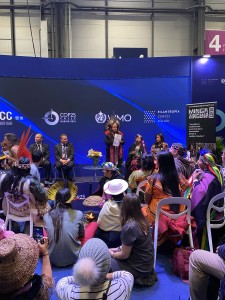Hi everyone, I know that I’m posting this very late, but I wanted to share some of the things I learned with you and wrote about a while ago but didn’t get a chance to post earlier.
On Monday Dec 9th I attended an interesting panel, which consisted of someone from the French Ministry of Environment, someone from the French Agency for Development, an indigenous leader from a community in Chad, and someone from the Tropical Forest Alliance (TFA), and someone from the Ministry of Environmental and Sustainable development in Colombia.
The panelists representing government and NGO talked about the programs that their departments or organizations are working on regarding deforestation.
The French government has a program in Cote D’Ivoire, working with local farming communities on sustainable cacao production and agroforestry. They’re also developing an anti-deforestation Action Plan, which is supposed to be out in 2020.
The TFA works on negotiating with private sector food providers that are contributing to deforestation in the Brazilian Amazon, and getting them to stop sourcing their products from deforested areas. The companies currently sourcing meat from deforested areas had a goal of net zero deforested sourcing by 2020, but have missed that goal.
This talk was interesting to me not just because of the content, but also the way it was delivered, and a specific thing that happened afterwards: after the panel, during the Q&A, a woman stood to ask: How can you in the French government say that you are doing so many great things, when right now you are supporting deforestation, the devastation of primary forests, and indigenous communities in French Guiana by goldmining companies? The French Minister was a bit at a loss for words, though he did say that they needed to change their now outdated mining laws, and said that he would like to talk about that issue with her afterwards. I wonder how that conversation went. Here’s a link to learn more about this issue: https://www.fern.org/news-resources/montagne-dor-mine-france-needs-to-walk-the-talk-on-halting-deforestation-in-the-tropics-937/
I wanted to hear more from Hindou Ibrahim, so I went to another talk that she was participating in that evening. It was a series of panels spotlighting indigenous leaders or youth who had worked with indigenous communities, hosted by the UN. The main topic was about NDCs, how Nature Based Solutions can and should be main contributors to NDCs, and how indigenous communities are leaders in nature-based solutions. It was great that the UN was giving a platform for different indigenous people to bring attention to the issues affecting their communities, though as Hindou said, the time of negotiations are finished; we have gotten as much agreement as possible and it is time for us to see how we can localize what we decide at the national level… there’s no time to negotiate anymore, and it’s up to communities to apply the recommendations that have been brought together at the international level, along with indigenous knowledge of land management methods that is thousands of years older than scientific knowledge and that can be paired with science to meet the NDCs and the needs of communities experiencing climate change. She said that we have the tools we need, but what is needed is implementation and financial investment: investment in nature and in youth.
The next day, on Tuesday, I witnessed a different kind of interaction between indigenous peoples and the UN. I had stayed late at the venue, and it was already 6:30 when I was about to leave, but I heard singing coming from the IPCC pavilion. I went to see what was going on. It was an event with a lot of people from an organization called La Minga that brings together indigenous peoples from all over Latin America to advocate for their rights and make their voices heard. They also did a ceremony there and one indigenous leader from Brazil addressed the Spanish IPCC representatives and asked why they haven’t done more, why are they allowing the killing of indigenous peoples. Her words were translated by a young indigenous woman. Then, they presented their charter on climate change, and a woman from Chile read it. It was emotional and raw. Here’s a link to the charter: https://350.org/wp-content/uploads/2019/12/CARTACLIMATICA-en.pdf
